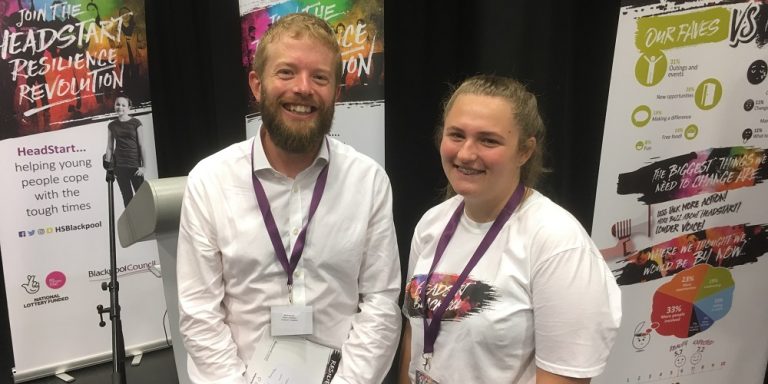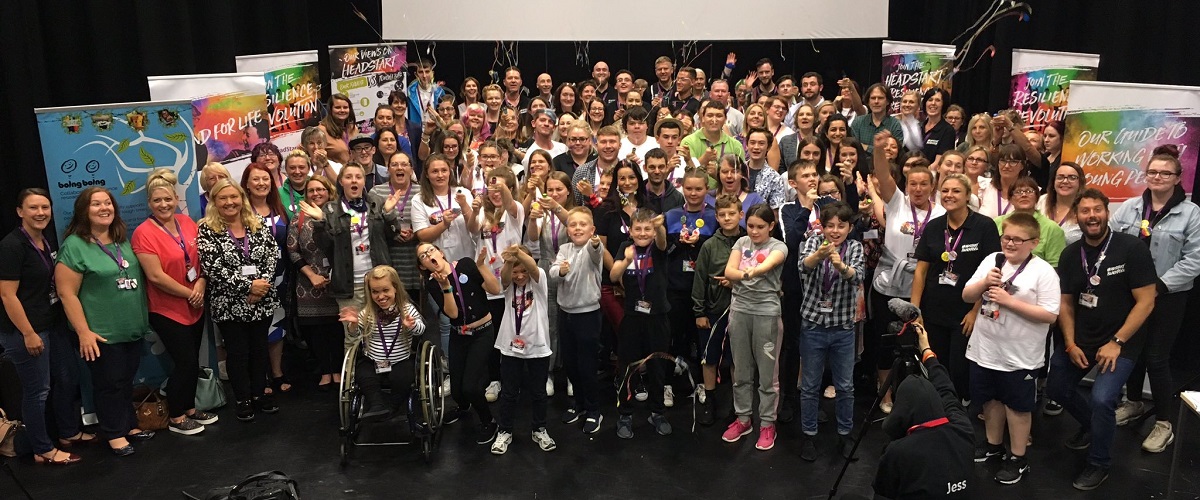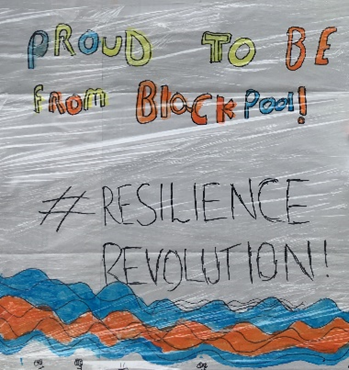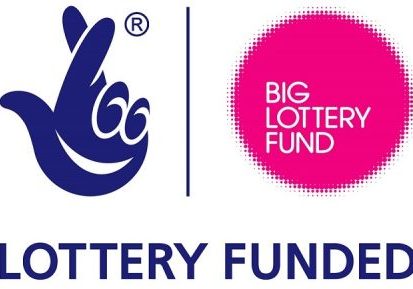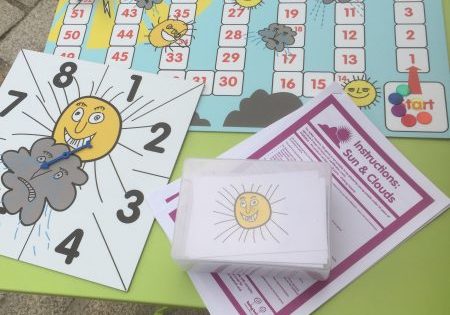Boingboing blogs from… The Big Resilience Get Together
‘Growing up North’ or in Blackpool to be precise! Ellie’s speech at the Big Resilience Get Together in Blackpool – 31 July 2019
By Ellie
This blog post is by Ellie (aged 16 years), who gave a response to a keynote speech by Martin Lennon (from the Office of the Children’s Commissioner for England) at the Resilience Revolution annual learning event called ‘The Big Resilience Get Together’ in July 2019. The 3-day learning event brought together an exciting mix of young people, parents, carers, practitioners, managers, commissioners, policy makers and academics to debate all things #ResilienceRevolution. This blog shares direct snippets of Ellie’s response given on the day (in italics), as well as some additional reflections she made following the event. #BRGT19
Hi, my name is Ellie and I am the Chair of a group called YPEG (which stands for Young People’s Executive Group) here at the Resilience Revolution in Blackpool. You can find out more about the Resilience Revolution on our website so I won’t say too much about it here, but basically young people like me are working with academics, workers and leaders to make Blackpool a more resilient town to grow up in. We are using a Resilience Framework developed by Angie Hart (a professor from the University of Brighton) to make changes for ourselves and the whole community. This year we have focused on campaigns and getting our voices heard.
Martin came to give a keynote speech at The Big Resilience Get Together about a report called ‘Growing Up North’. The report sets out some of the challenges and disadvantages that young people like me can face just because we are living and growing up in the North of England. I had read the report in advance of Martin’s speech, but had not heard what he was going to say on the day. Here is what I had to say in response to Martin, and why I am involved in the Resilience Revolution to campaign for things to be better….
I started my response by reflecting on what growing up in Blackpool has been like for me and what I have gained from different opportunities. But I quickly turned my attention to those who are not as fortunate as I am to be feeling as clear and as supported in my plans for the future. What quickly became apparent from listening to Martin and from reading the Growing Up North report was the difference in outcomes for those in towns like Blackpool in the North of England and those in cities like London and across the South of England. To demonstrate my strong feeling on these matters I said…..
“Growing up in Blackpool for me has given me the opportunity to get involved with HeadStart and given me the confidence to get myself the role of Deputy Head Girl in school. I feel really positive about school because all of my teachers are really supportive with my aspirations and encourage me a lot.
“However, living in Blackpool has made me feel like I am set back compared to people that live in the South. I feel like people do not think I can attend a good university because I do not live in London. Why is this the case? Why should I be treated differently because I live in the North of England? Although I feel really positive and clear about my future, many other young people might not feel the same way due to the fact that there is poor housing, poverty, deprivation and other factors that impact the North of England and Blackpool. The negative stereotypes that people have of the north and my home town make young people think that they cannot achieve because people are saying that they cannot. Young people in Blackpool do not have the same self-belief and confidence that young people in the South of England might have about their future aspirations.”
After delivering the opening of my keynote response to the packed room of over 100 people, I grew in confidence and wanted to challenge those listening to consider what kind of society we want to promote for our young people. I went on to say….
“Before we can consider what a more inclusive education system looks like, we need to first turn our attention to the kind of society we want to see. I want to see a society where everyone feels comfortable, has enough money to live and where people do not feel like inequality is holding people back. Social Mobility has to be something that is for everyone, boy or girl, academic or vocational learner, North or South. We do not want to grow up in a country that does not only fail to tackle poverty and inequality; but a country that has systems that in part contribute to the poverty and inequality that many young people and families face.”
I then made reference to a response Martin had published in The Guardian in which he highlighted the need for education, health and social care to be more cohesive. This is something that really resonated with me and a really important aspect of the Resilience Revolution in terms of getting systems to work more closely together, and to be more aware of the interactions and impact different systems can have on each other and subsequently on those within the system.
“I read your response in The Guardian where you called for the need to connect education, health and social care and this is something that I agree with. Although I strongly agree that education needs to be part of a more inclusive system with health and social care, in addition to this I think that the education system could make some really useful changes by including young people and families more and seeing young people and their families as part of the school community. A lot of the time I see situations where schools do not know what is going on for young people and their families. Working co-productively with entire school communities could ensure that schools are offering the right levels of support to those young people and families who need it the most.
“One of the ways that I think the education system could be supported to be more successful is by not treating the North differently to other areas in terms of the funding that schools in the North receive. The Growing up North report highlights that in London funding has made a massive difference to the quality of education young people receive and I think that this has to change to make Blackpool a better place for young people to be educated in and grow up in. Young people across the North and in Blackpool face the double whammy of being underfunded and more than half of the secondary schools serving the North’s most deprived communities are judged to be less than good.
“The Children’s Commissioner stated that where young people live and grow up should not be a barrier to making the most of their lives. I agree with this, living in a deprived town gives young people in Blackpool fewer opportunities to grow into someone that they want to be.”
As well as offering my perspective and engaging with what Martin had said in his keynote speech, I wanted to highlight particular points from the Growing up North report that I was really saddened and angered by. I did this by focusing on the difference in outcomes for those who are on free school meals and those who are not.
“In the Growing up North report, it also states that, “children in receipt of free school meals in London are 40% more likely to get good GCSE results in Maths and English and two times more likely to go to university than children receiving free school meals in the North.” This makes me as a young person feel that people are not treated equally in different areas of the UK. Knowing this makes me worried for my friends’ futures because why should they get treated differently just because they live in the North? Why should anybody who is receiving free school meals be less likely to obtain the qualifications they need to reach their potential and match their ambition and crucially why should this vary so much across the UK?”
Coming towards the end of my speech, and building in confidence, I was determined to express my frustrations and concerns about what I think is a current political failure to tackle child poverty and other key social issues, and to miss opportunities which I think could help…..
“In addition to this, over the weekend the Government faced renewed warnings about potentially losing £3.5 million pounds that the European Union has awarded the country to tackle child poverty and homelessness. Given that across the public sector local authorities and schools face increasing financial pressure, it should be a great source of embarrassment for this Government that they have already had to return £580,000 and could have to return even more of the money awarded by the European Union. This could be a much needed lifeline for many of our struggling schools or could be used to support deprived young people and their families.”
I finished my keynote response by concentrating on what we are doing in Blackpool to try and ensure that young people growing up here are able to have ambition and aspirations for themselves. We are doing this through the Resilience Revolution, and by applying our definition of resilience, which is ‘beating the odds whilst also changing the odds’…..
“At HeadStart through the Resilience Revolution we are proud to recognise the importance of a more inclusive education system and we are striving to promote this by working co-productively across the town. For example, working alongside the School Improvement Board to discuss changes about exclusion rates. From these interactions, we made them aware that very often schools don’t know what’s going on at home. From talking with pupils from schools across Blackpool, we found that schools did not always highlight our achievements.
“I would like to thank Martin once again for giving us such an interesting keynote about Growing up North, and I hope you will take away the thoughts and feelings of young people across Blackpool. We would be delighted to welcome you back to Blackpool in the future.”
As a co-leader of the Resilience Revolution, I was pleased to be able to give a response to Martin on the day, and to be able to share some of it via this blog post. We are trying to create more places where young people and adults can discuss important issues together, and come up with solutions together. Next year, we are hosting an International Resilience Revolution Conference here in Blackpool from 9-10 September 2020 where the discussions and learning can continue. We would love you to join us! You can find out more on the conference website. #ResRev20
